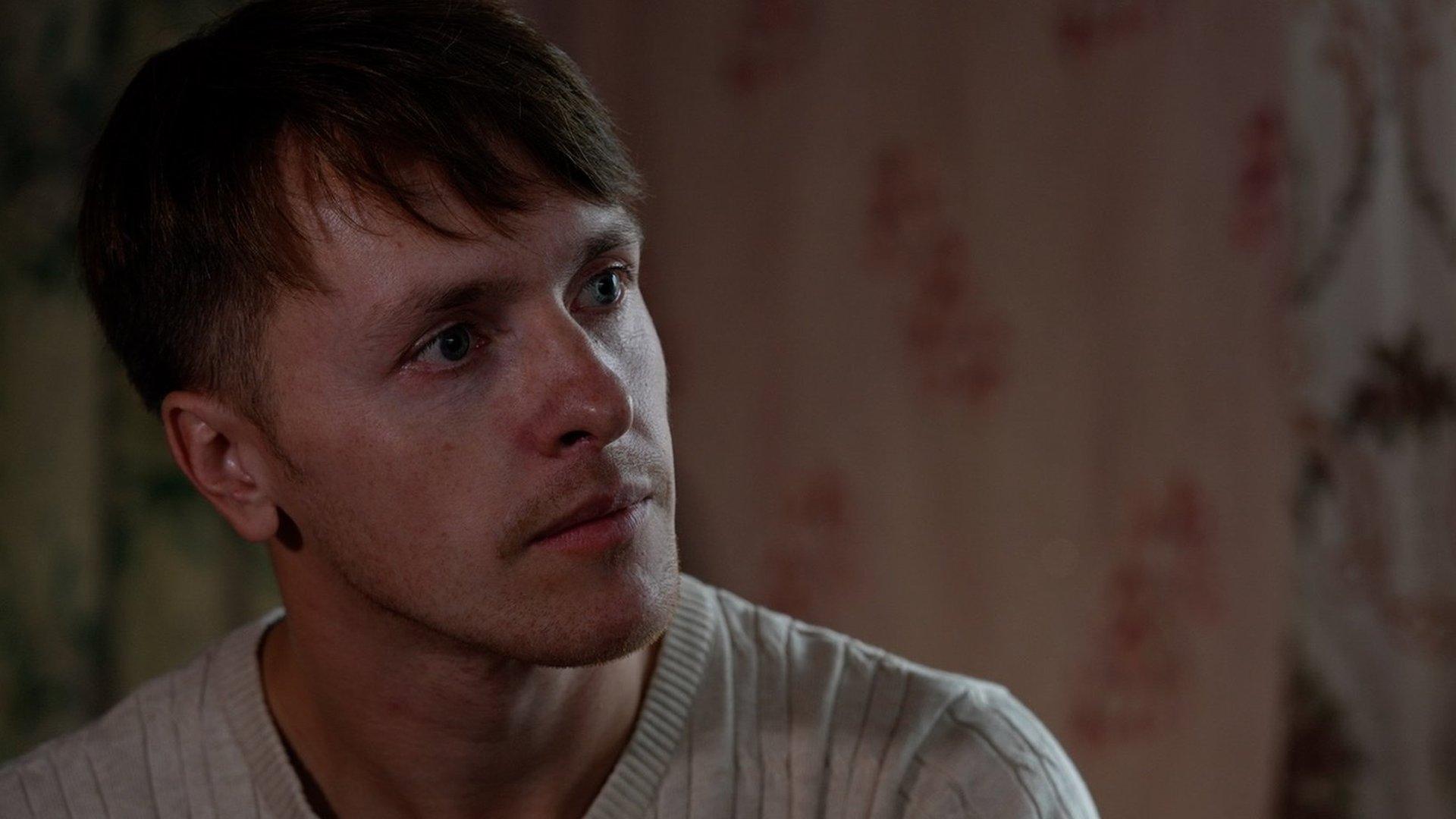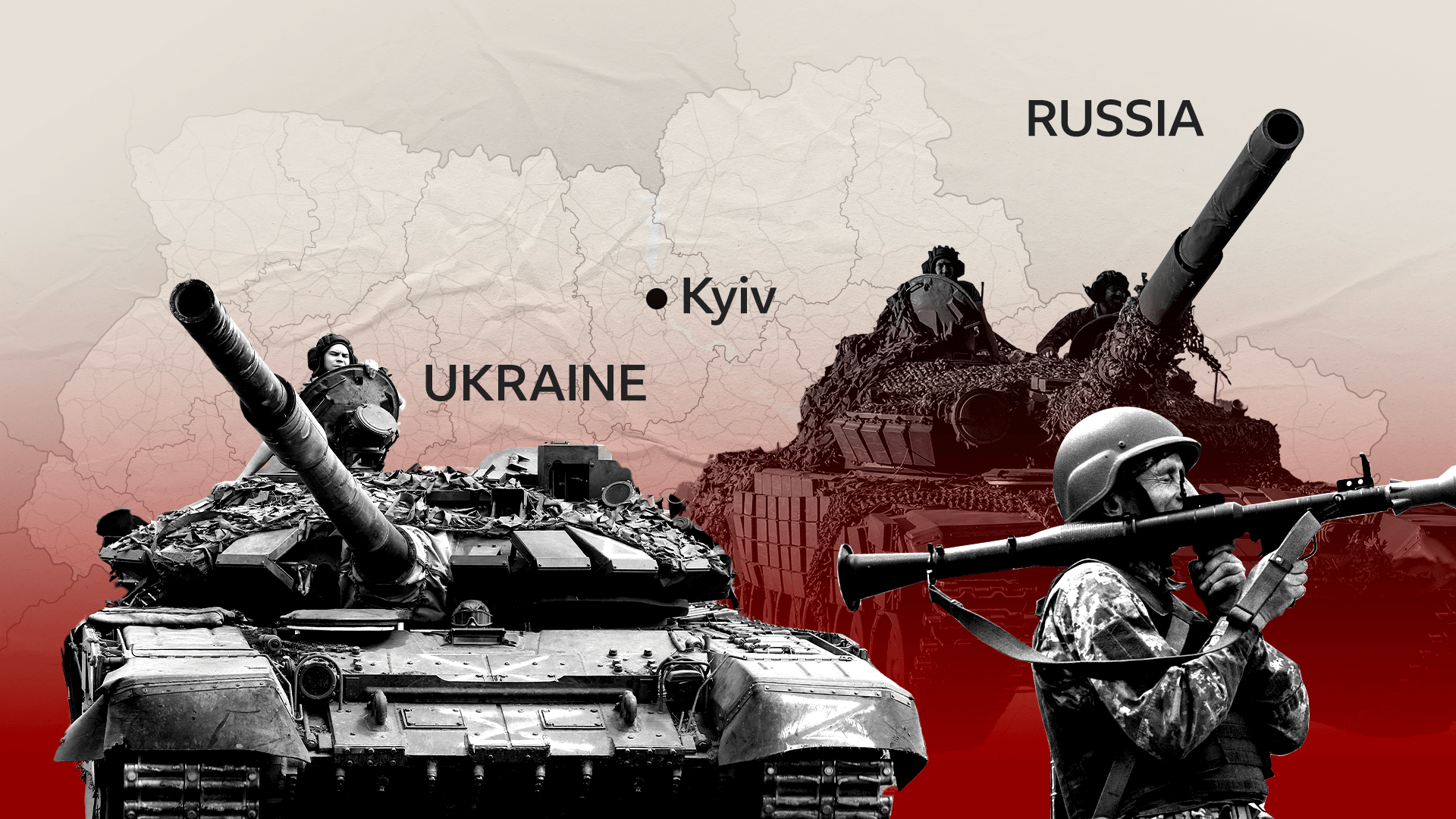Ukraine war: Russia's uncertain future a product of its past
- Published
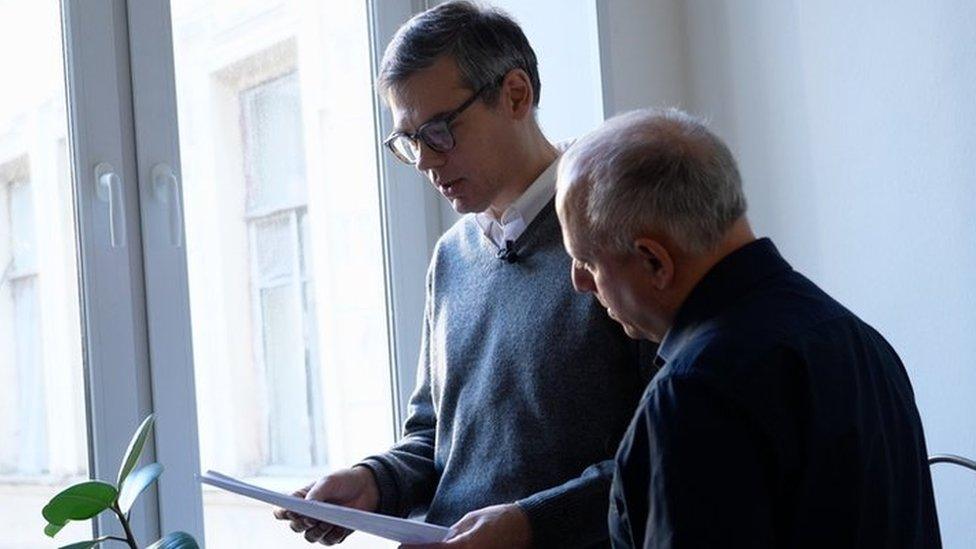
Lecturer Denis Skopin (left) holding his dismissal papers from St Petersburg State University
In his St Petersburg apartment, university lecturer Denis Skopin shows me the document which has changed his life.
It's headed: "Directive No.87/2D. Subject: Dismissal."
Until recently Denis was associate professor at the Faculty of Liberal Arts and Sciences of St Petersburg State University. But on 20 October the university sacked him for "an immoral act incompatible with educational functions".
What was this so-called immoral act? Participation in an "unsanctioned" rally.
On 21 September Denis joined a street protest against the Kremlin's decision to draft Russians to fight in Ukraine. Earlier in the day, President Vladimir Putin had declared "partial mobilisation" across the country. During the demonstration Denis was arrested and spent 10 days in jail.
"Freedom of expression in Russia is in crisis," Denis tells me. "All kinds of freedoms are in deep crisis."
"After I was released from detention, I worked for three more weeks. The university sent me letters asking me to explain my absence. I replied that I'd been arrested for participation in a protest and put in detention. Then the Human Resources department called me and told me that I'd been sacked."
On his final day at work, Denis's students gathered outside the university to say goodbye.
In an impromptu speech (the video was posted online) he told them:
"What is an immoral act? Acting against your conscience and passively obeying someone else's orders. I acted according to my conscience. I am sure that the future of our country belongs to you."
The students broke into applause for their sacked teacher.
"I love my students very much," Denis tells me. "They are very smart and they understand very well what is happening now in Russia. Their [show of] approval was not for me personally. Rather, it was disapproval of what is happening now in Russia.
"Many people in Russia don't dare to protest because they risk being punished for it. But many would like to. And, for these people, providing approval to those who do protest is a way of disagreeing with what is happening in Russia."
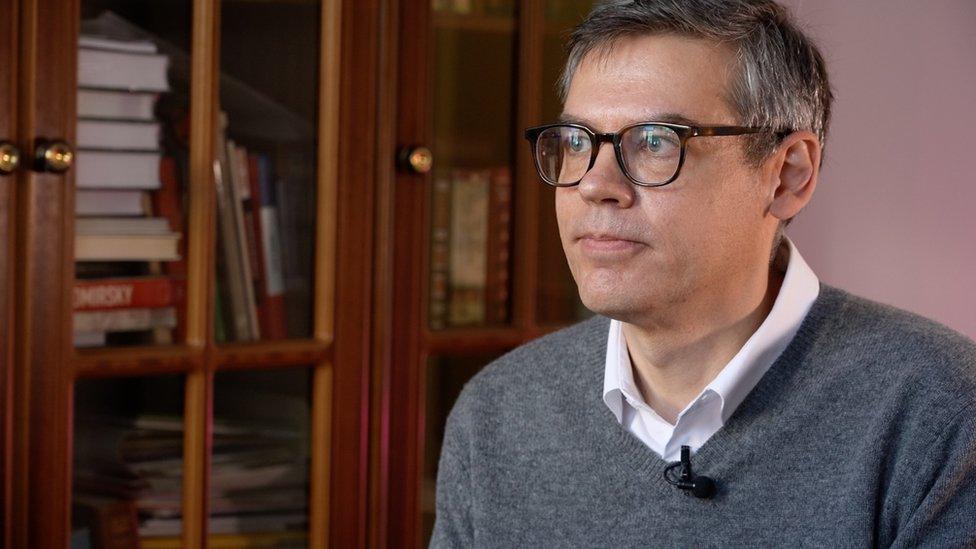
Denis says a quarter of his colleagues have left Russia since its full-scale invasion of Ukraine
Denis Skopin's story highlights not just the pressure which opponents of the Kremlin's "special military operation" are coming under here. It also raises questions about Russia's future.
"Locked up with me in the detention centre there were IT specialists, scientists, doctors, teachers and students. Many of them are now abroad. Like my cell-mate, a young talented mathematician.
"About 25% of my immediate colleagues have already left Russia. They left after 24 February. Some of them left immediately, some left after mobilisation was declared. I think Russia is losing the best people now. The most educated, the most energetic, the most critically thinking people are leaving the country. In short, Russia is going in the wrong direction."
An uncertain future is not solely the consequence of the present. It is also the product of Russia's past.
Across town a small group of St Petersburg residents is standing beside a monument to the victims of Joseph Stalin's Great Terror of the 1930s.
The monument is made out of a large rock from the remote Solovetsky Islands, home to one of the most notorious forced labour camps of the Gulag. Solovki camp was set up to imprison political prisoners alongside other convicts.
People are queuing up at a microphone. They are taking it in turns to read out names of individuals who were arrested, condemned and executed in and around St Petersburg.
"Ekaterina Gansovna. Age: 46. Postal Worker.
Arrested: 9 December 1937.
Shot: 18 January 1938.
Yulia Stanislavovna. Age: 41. Pulp Factory Accounts Manager.
Arrested: 27 September 1937.
Shot: 21 December 1937."
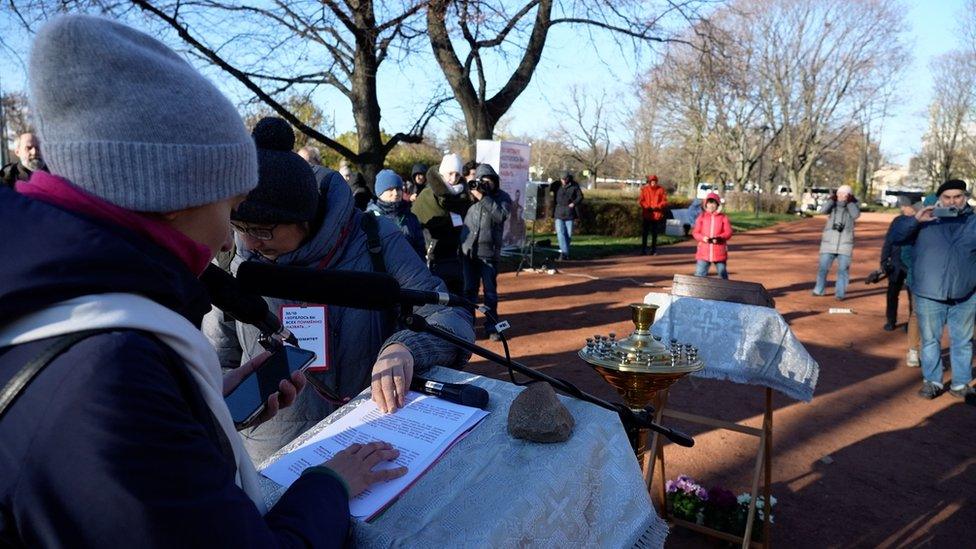
At a monument in St Petersburg, people read the names of victims of Stalin's Great Terror
It is thought that Soviet dictator Stalin had a million of his own citizens executed. Millions more lives were destroyed in his machine of terror which cranked out arrests, deportations and forced labour on a mass scale. Some of his successors, like Nikita Khrushchev and Mikhail Gorbachev, did denounce Stalin's crimes.
And yet, in Vladimir Putin's Russia, Stalin has enjoyed something of a rehabilitation. The authorities today place less emphasis on the darker chapters of the Stalin years, while Stalin himself is often portrayed as a strongman who defeated Nazi Germany and turned the Soviet Union into a superpower. Putin's Kremlin seeks positives in the past - victories.
"Unfortunately, our country didn't turn over this page properly. Stalin's repressions were not talked about enough or fully condemned. This is why the war in Ukraine is happening today," says pensioner Ludmila, who has come to lay flowers at the Solovki Stone.
"Experience shows that remaining silent leads to bad things. We mustn't forget the bloody stains of our country's history."
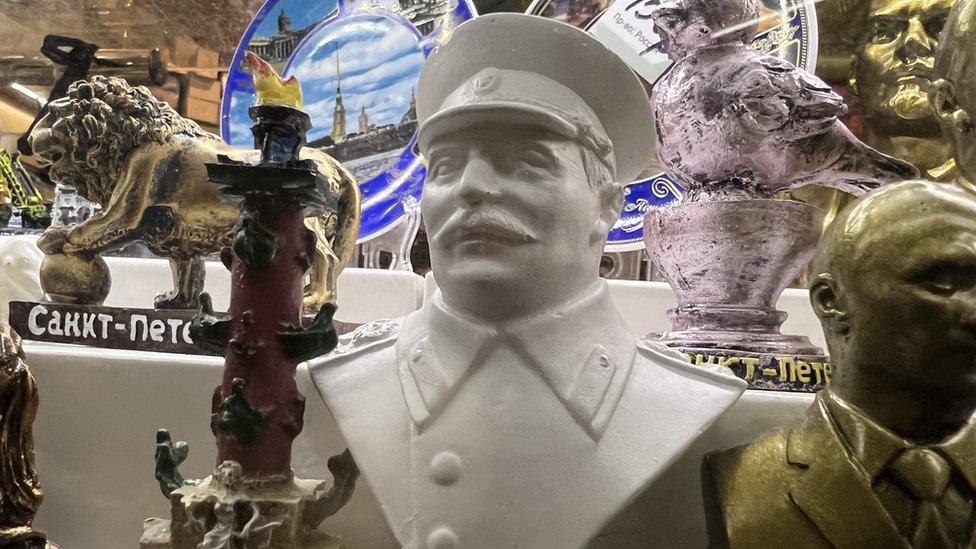
Soviet dictator Joseph Stalin has undergone a kind of rehabilitation in Putin's Russia - you can even buy Stalin merchandise
Sacked university lecturer Denis Skopin has studied the Stalin years. He sees parallels between then and now.
"I just published a book in English about how people in Stalin's Russia removed from group photographs those who were declared 'enemy of the people'. Colleagues, friends or even close relatives had to remove all signs of them from photographs. They did it with scissors and with ink.
"The faculty where I taught had a partnership with Bard College, an American liberal arts college. Last year Bard College was declared an 'undesirable organisation' in Russia. So, our faculty broke the partnership and the Bard College name was removed from the stands displayed in the corridors of our faculty using exactly black ink. In the same way as in Stalin's Russia."
If, as Denis claims, his students "understand very well" what is happening in Russia and Ukraine, that raises a question: if young Russians are not convinced by the Kremlin's arguments, how will the authorities persuade the public long-term to rally round the flag and back the president?
Answer: by making sure young people "understand" events as the Kremlin does.
To help achieve that, a new patriotic lesson has been introduced into schools across Russia for all schoolchildren: "Conversations About Important Things." It is not part of the official curriculum, but it is the first lesson on a Monday morning and children are strongly encouraged to attend.
What "important things" are discussed there? Well, when President Putin played teacher in Kaliningrad in September, he told a group of children that the aim of Russia's offensive in Ukraine was to "protect Russia" and he described Ukraine as an "anti-Russian enclave." You can see which way the "Conversation" goes.
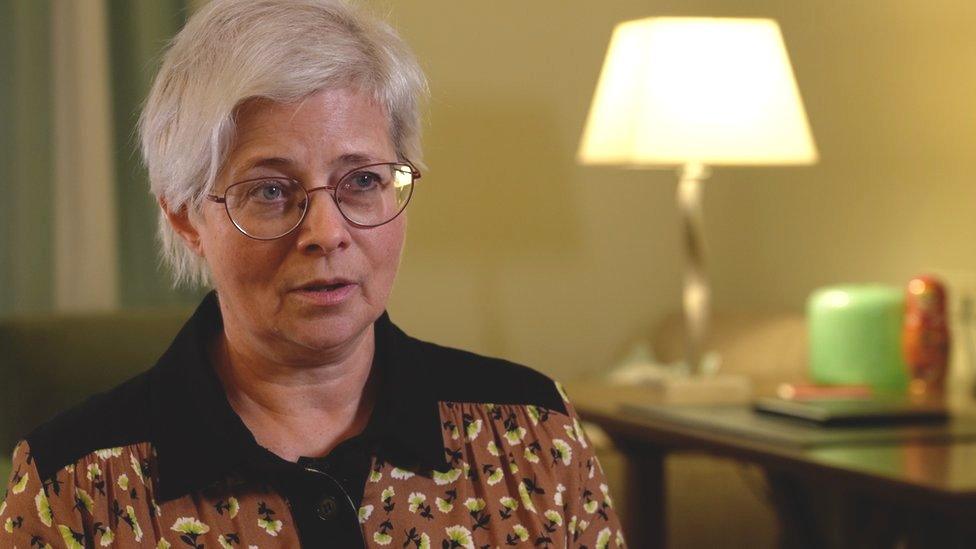
Olga Milovidova says the "forced education" reminds her of the Soviet era
"This is forced education. To my mind this is as dangerous as it was in Soviet times when we had 'political information' lessons," says St Petersburg teacher Olga Milovidova, who retired last month. "In those days we had to read the newspaper Pravda. And I remember we had to read books by [Soviet leader] Brezhnev as if they were masterpieces. We had to give only positives opinions. There was no critical discussion.
"Education and patriotism mustn't be put together," believes Olga, who was a deputy school director. "There are children who just believe. They open their eyes and they are ready to believe in anything. That is very dangerous."
- Published1 November 2022
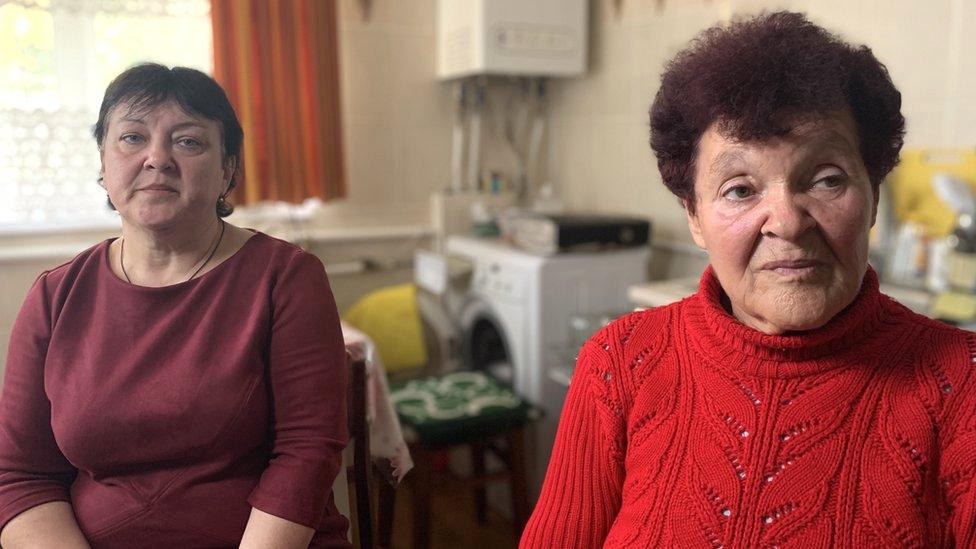
- Published21 October 2022
